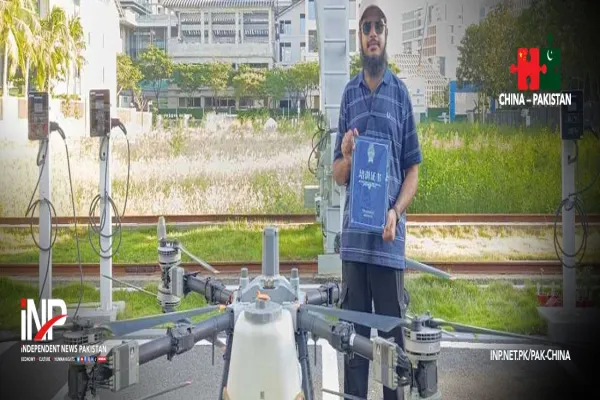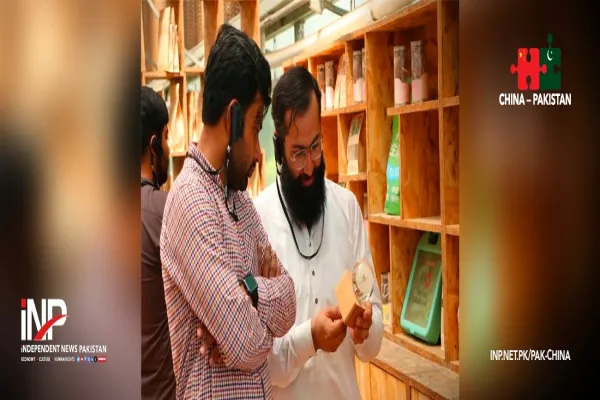i NEWS PAK-CHINA
The first Confucius Institute in Islamabad established since 2005 has been offering Chinese language teaching for NUML (National University of Modern Language) students and nearby communities. After 17 years of development, the institute has set a successful example of cultural exchanges between the brotherly countries China and Pakistan. With the deepening cooperation on China-Pakistan Economic Corridor (CPEC), the role of Confucius Institute in Islamabad will become increasingly imperative. As students majoring in international communication at Renmin University of China, we are intrigued to know the experience of Confucius Institute in cultural exchanges. We interviewed Daojian Zhang, a lecturer in the Chinese Culture Research Institute of Beijing Language And Culture University. Zhang served as the Chinese director of Confucius Institute in Islamabad from October 2012 to August 2021.
This interview is closely related to his experience in cultural education in the Confucius Institute. “The Meaning of This Job Gave Me Faith” Q: Why did you decide to embark on Chinese language education in Confucius Institute in Islamabad? Zhang: To be honest, at the beginning, Confucius Institute in Islamabad needed a Chinese director, so my university (Beijing Language And Culture University) asked me if I was willing to take the job. I said yes without thinking twice. However, it was after I actually served as a director that I truly realized the meaning of this job. It’s widely acknowledged that Pakistan and China have a close partnership. We Chinese call Pakistan “Batie”(iron brothers), referring to the iron-like friendship between the two countries. After Chinese President Xi visited Pakistan in 2015, cooperation on China-Pakistan Economic Corridor has become increasingly deep, as well as the demand for Chinese language learning soaring in Pakistan.
I was the director at that time, deeply impressed by the friendliness of Pakistani and their enthusiasm for Chinese language learning. I remembered that there was an old man with grey hair studying Chinese in our class, with a relatively poor memory but a hard-working quality. I remembered that some students relentlessly learned to make dumplings and write Chinese characters. All these things have remained fresh in my memory, which gradually made me understand the meaning of my career in Confucius Institute in Islamabad. I put my passion into Chinese language teaching, just as students gave their enthusiasm for learning. The meaning of this job offered me spiritual support, gave me faith to stay here. “We Share Cultural Similarities” Q: After so many years in Pakistan, have you seen any cultural convergence between China and Pakistan? Zhang: Yes, we share cultural similarities in general.
For instance, whether Islam or Confucianism, they were all born in inland agricultural civilization which emphasized on adjustment of interpersonal relationship. Therefore, Chinese and Muslims have a lot in common. One is family values. In traditional Chinese family, we pursue “four generations under one roof”. In Pakistan, their expectations of family are pretty much the same. I had visited many Pakistani families, including the one of our university president. Those families, with several generations living together, were rather warm and sweet. I think we have shared something in common that way. I know Confucius Institute is facing lots of criticism and misunderstandings, but I still see its unique role. When it comes to cultural communication, I tend to sort it into three kinds. The first is the flow of mass culture, like movies, TV series, pop music and other cultural products.
Why call it “flow”? It’s because these products spread extensively and casually, and either the choices of audiences or the meet of cultures is casual. The second kind is the flow of breaking news or dialogues about different opinions. News agencies have to cover breaking news and different stances and opinions on global issues and provide facts and argument. Since we have cultural products and news media, why is the Confucius Institute still needed? The answer lies in the fact that Confucius Institutes located in different universities of the world can provide available daily platforms for language learning and cultural exchanges for university students and local people. It is a daily platform that makes direct and concrete interaction between teachers and students possible. Q: Can you share a story of impressive students? Zhang: I remember a girl.
She came from a village, knowing little about Chinese, but was rather diligent and clever. After studying in our Confucius Institute, we provided her with scholarship to study in China. I heard that she was very active at university in China, participating in a variety of activities, even joining shows in CCTV(China Central Television). Now, she has gotten a bachelor’s and a master’s degree in Beijing Language And Culture University. Learning Chinese has incredibly changed her life. “Mutual Affinity, Shared Consensus” Q: Can you share your experience in organizing cultural activities in Confucius Institute? Zhang: In cultural activities, we always introduced traditional Chinese food like dumplings, moon cakes and sweet dumplings which really attract many students. With a simple sales pitch “Who want to try?”, we would gain high participation from students.
After coming here, they are more likely to be curious about other things of China. Our teachers would introduce Chinese fairy tales to them, like The Archer and the Suns, Chang'e Flying to the Moon, the Cowherd and the Weaver Girl...Some students would share similar stories in Pakistan. Gradually, an atmosphere of cultural exchanges would take shape. Another interesting example is that when students were reading The Analects of Confucius, they often came to the teachers’ office and said “See, this is exactly the same as what our prophet said.”“Great minds think alike.”I told them. Myself and other teachers, we would usually use the word “exchange” instead of “communication”. We deeply know that when we want to introduce our culture, we should also learn their culture. In a word, mutual respect is the basis of cultural exchanges. Therefore, when it comes to cultural exchanges, do not stress the difference.
As the old saying goes, mutual affinity, shared consensus. Mutual affinity comes from rational consensus. Whether heterogeneous or homogeneous, all kinds of cultures are derived from primitive psychology and ethics. They share numerous similarities. “More Peaceful, More Open, More Equal, More Inclusive” Q: From your perspective, what can be done to promote international Chinese language education? Zhang: Take cultural education as cultural exchanges. We have to embrace a more peaceful, more open, more equal and more inclusive mentality when sharing language and culture with other people. With an inclusive and peaceful mind, I believe we can overcome all the challenges and turn them into opportunities. (Contributed by Wang Jingwen, Song Siyi, postgraduate students at the School of Journalism and Communication, Renmin University of China; Jiang Xiancheng, PhD student at the School of Journalism and Communication, Renmin University of China)
Credit: Independent News Pakistan-INP









